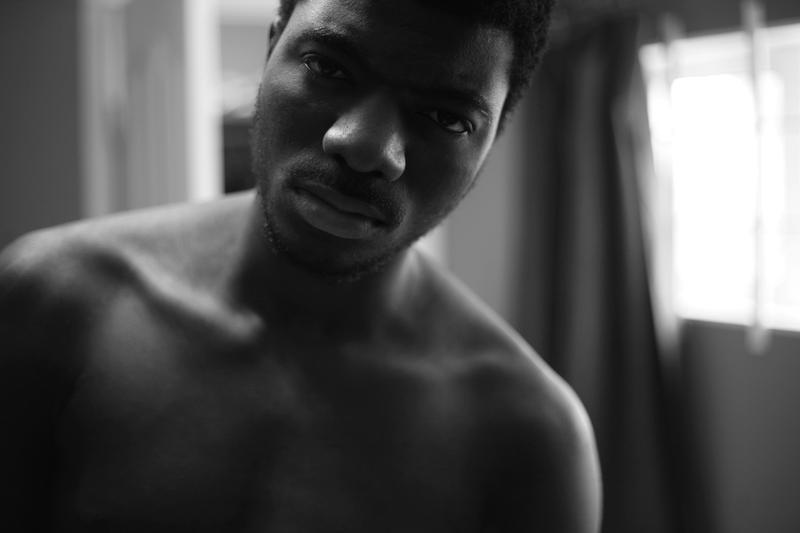by Mary Sutton
September 28, 2022
Mary Sutton is senior content editor at the Academy of American Poets and poetry editor at West Trade Review. She was formerly the NEH Scholar in Public Humanities at Library of America where she worked with Kevin Young on African American Poetry: 250 Years of Struggle and Song and the book’s companion website www.africanamericanpoetry.org.
A Shiver in the Leaves by Luther Hughes; BOA Editions; 80 pages; $17.00
When you first glance at the cover of A Shiver in the Leaves, you might, as I did, briefly mistake Luther Hughes’s name for that of Langston Hughes—the forebear with whom the younger Hughes shares both initials and a surname, in addition to being an heir to one of the world’s richest literary heritages. The younger Hughes, like his renowned ancestor, explores the vastness of Black identity within this début, in which he, more pointedly, also tries to understand and reckon with what it means to be a young, queer Black man in a nation that has rendered both queerness and Blackness monstrous, if not altogether invisible. While the elder Hughes’s sexuality remains a mystery, his having come from an era in which such proclivities were explored but seldom discussed openly, especially if you were Black, the younger Hughes boldly illuminates the ravenousness of his carnal desire in this supernally erotic collection, while also navigating through the ambivalences that can often taint both interracial intimacy and that which occurs between Black men.
Though all African American poets are the literary offspring of Langston Hughes, Luther Hughes’s work feels more directly descended from that of Richard Bruce Nugent, a lesser-known fellow Harlem Renaissance figure and the first Black gay man who spoke openly in his work about being “in the life.” Hughes’s frankness about sex and the necessities of both connection and tender care, particularly toward oneself, are also reminiscent of Essex Hemphill’s work and, more recently, the poems of Jericho Brown, Danez Smith, and Philip B. Williams. Forthrightness about Black gay sexuality—particularly, the way in which Hughes roots the reader so deeply into his body in some of this collection’s poems, thus declaring himself truly here and fully sensate, may be a way to fight against white, heteronormative patriarchy’s determination to erase that which does not serve its ideological apparatus. It was, after all, that apparatus’s relentless hatred that engulfed Hughes’s elders, those whose lives were lost to AIDS, violence, drug abuse, and forms of systemic erasure that we may have yet to identify.
Being both Black and queer in Seattle, Hughes is undoubtedly attuned to the feelings of being both invisible and hyper-visible—not unlike that touch of black in Liberty Paints’ “Optic White” in Ralph Ellison’s Invisible Man. The Pacific Northwest is now a bastion of far-left liberalism, but the region also has a history of expurgating and banning Black and Asian communities. How much of a sense of belonging does a young, Black, queer man from Seattle feel on Capitol Hill, an LGBTQ community that has, like much of San Francisco, gentrified queer communities of color into near oblivion? Blackness is central in this collection, which often reads as a paean to Seattle. I use that term both in reference to the solemn lyric poem performed by a chorus for thanksgiving in classical antiquity, and in reference to the ancient Greek god of healing, as it is healing—both of the communal and individual spirit—that seems to be one of this collection’s aims.
The book begins with “Tenor,” one of two poems in the collection inspired by Jean-Michel Basquiat. Hughes invokes the artist’s visual motif of crowns and relates the condition of living with a sense of imminent doom. Crows, which feature most prominently among the birds used as symbols in this collection, swarm and hover in this poem as ominously as they do in a Hitchcock film. A moment of mockery, in which the crow watches Hughes’s narrator “through the window” and laughs as he drinks “[his] third bottle of wine” becomes reminiscent of the confrontation between Edgar Allan Poe’s narrator and the raven. Poe was a writer haunted by Blackness—a pathology that he may have explored symbolically in “The Raven” and more overtly in his only novel, The Narrative of Arthur Gordon Pym. Hughes, cognizant of the white gaze but not particularly interested in it, wonders, in poems such as “Inside the River, I Covet,” what his Blackness means to a presumably white partner who marvels over the narrator’s lips and says that he only dates Black men. The narrator recognizes the comment as problematic, though his desire gets the best of him, as Hughes illustrates in lines that cleverly subvert the cliché metaphor of the thorned rose, magnifying, instead, the exquisite pain that beauty and lust can heap upon the body: “I wanted to spoil beneath / that splinter, that long-tongued thorn.” While listening to a nineties mix of raunchy hip-hop and New Jack Swing slow jams, the narrator allows the man to enter him, “becom[ing] his honeyed hanker,” without ever forgetting what likely motivates this particular lover: “You like daddy inside you […] his snake at the neck of my blackness. My blackness—” There is a brusqueness in this final line, indicated by Hughes’s usage of the em-dash. Despite the narrator’s insistence on reclaiming the source of his lover’s fetishism, the matter is not resolved and likely can never be.
Hughes’s exploration of an ominous carnality in this collection is reminiscent of both Claude McKay’s “Birds of Prey” and, particularly, Robert Hayden’s “A Plague of Starlings.” Birds explode in the latter, a phenomenon similarly recounted in Hughes’s “Descent”: “But here’s what I know: / blue jays aren’t blue. If you crush its wing / into powder, it will be red." There is a subtle parallelism here, too, with the screaming “bluebird” in his lover’s eyes in “Inside the River, I Covet.” McKay, whose own queer context has only recently been recovered, is another Harlem Renaissance-era literary ancestor whose spirit hovers over this collection, which, like McKay’s work, explores both political contingencies and humanity’s prerequisite for tenderness, as a coda and salvation. This point is made particularly clear in the collection’s final poem, “Such Things Require Tenderness”: “Before the storm, a declaration of birds. / Before the birds, a discarded pill […] The rain is clearing. I hold out my hand.” There is a kind of cleansing here, a choice to live another day, in this city known for its supposedly ceaseless rain. In “Leave the Crows Out of It,” a peaceful ode in eighteen lines, which almost begs to be a sonnet, Hughes’s narrator welcomes the dawn from a modest apartment complex. With the blackness of the crows gone, the atmosphere becomes redolent with other colors: the golden sunlight, the evergreen that likely surrounds the apartment complex, as well as the “bluing air, the blue trust of Priuses, / blue Grocery Outlet inside me." The narrator of this poem is faithful to Seattle because this is his town, as he declares, and the proof is in the presences of his “DNA on the eaves / [his] flock of goats heckling the fence on 64th." “DNA on the eaves” is eerily homophonic with “blood on the leaves” in Billie Holiday’s “Strange Fruit,” while the flock of goats calls to mind Daphnis, Longus’s Sicilian shepherd and the inventor of pastoral poetry. Daphnis was also the ideal eromenos, or the passive love partner in homosexual relationships—a role that is fraught with both pleasure and tension in Hughes’s work: “I was a boy / with a hole / other boys / stuffed themselves into." The best way for this narrator to prove his devotion to this city is by giving in to its demand to arch his back at dawn, as though to greet both its sensual pleasures and to prepare for the pain it inevitably inflicts.
While Hughes’s new collection may be allusively reminiscent of his Harlem Renaissance forebears, visually, it may also call to mind Robert Mapplethorpe’s controversial images of Black male bodies on display. Mapplethorpe was a contemporary of Hemphill and poet Melvin Dixon and, like them, succumbed to AIDS-related illnesses. However, it is Mapplethorpe’s visual legacy that remains predominant when we discuss the cultural artifacts from the gay community between the 1970s and 1980s—largely due to the photographer’s obsession with “playing in the dark,” whether it was the sadomasochistic leather bars in Manhattan’s Meatpacking District or his focus on the Black male penis. By expressing through poetry his desire to bottom, to be dominated, Hughes subverts the will to objectify Black queer men by focusing the reader on his pleasure, which is complex and not politically correct—that is, Hughes’s narrators want to see and feel the “bullness” from their partners, even within the parameters of mundane coupledom. In “Culture,” Hughes aims to push the reader’s limits by detailing how one member of a group of young Black men imagines their confrontation with white police officers as a pornographic scenario—a visualization that is meant to bring comfort, until he remembers “how after the frisk the black boy in the porn is scripted to blow the officers." Hughes repeats the cinematic motif in “The Death of the Moth,” which directly precedes “Culture.” This poem more bluntly describes the fear of deadly confrontations with police—a fate so common it is cliché: “You know the story before I tell it ..."
There are plenty of contemporary books, especially poetry collections, that are as deeply engaged with both the literary past and the political present as this one since, thankfully, the publishing industry is finally figuring out that there are as many literary visions as there are people on this planet. Hughes, despite his sexual candor in this collection, seems modest about the level of erudition he brings, both formally and contextually. Whether or not my assumption is correct, this book undoubtedly heralds the arrival of a significant new voice in literature.
©2022 West Trade Review
__________________________________________________________________________________________________________________________________________________________________________
__________________________________________________________________________________________________________________________________________________________________________
__________________________________________________________________________________________________________________________________________________________________________
__________________________________________________________________________________________________________________________________________________________________________
__________________________________________________________________________________________________________________________________________________________________________
Free of Any Eden: Desire, Queer Black Identity, and the Literary Legacy of Luther Hughes’s A Shiver in the Leaves
POETRY REVIEW
Stay Connected to Our Literary Community. Subscribe to Our Newsletter
Photo by Pluetoe from Pexels




